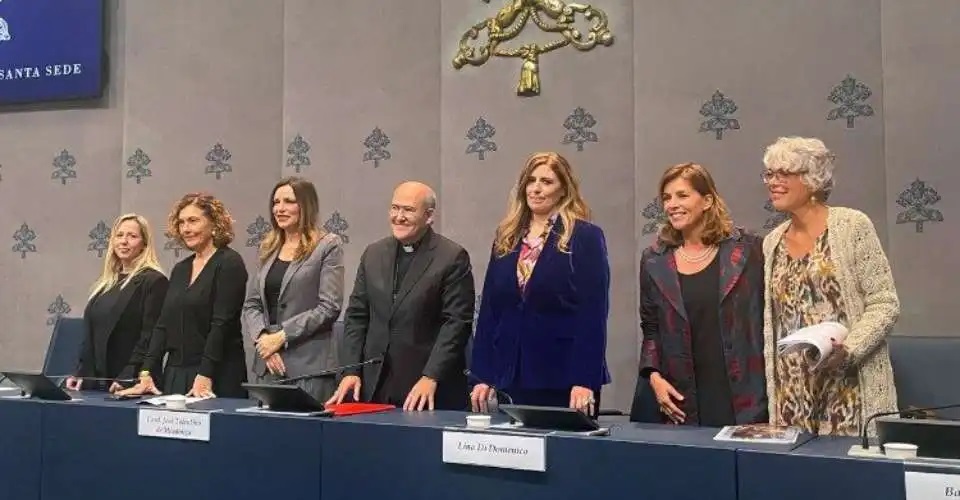Meeting of representatives of Catholic cultural centers from around the world held at the Vatican
Feb 19, 2025

The press conference to present the Jubilee of Artists. (Photo: Vatican News)
By Justin McLellan, Catholic News Service
Evangelizing through culture is a challenge for the church, especially in societies where faith is seen as “something alien,” participants said at a Vatican-sponsored discussion on faith and culture.
“The church needs to have a good relationship with the arts,” said Stephen Callaghan, a playwright and director of the Archdiocese of Glasgow Arts Project, which, since 2006, has allowed artists of all backgrounds to have a “positive encounter with the Catholic Church.”
“The arts are about exploring what it means to be human, and the incarnation of Jesus Christ changed that forever,” he said Feb. 17 during a meeting of representatives of Catholic cultural centers from around the world at the Vatican.
The gathering, held at the Vatican as part of the Jubilee of Artists and the World of Culture Feb. 15-18, brought together representatives of Catholic cultural centers and church bodies dedicated to culture.
Callaghan said the church should not shy away from expressing its values through the arts, and he pointed to his organization’s faith-inspired performances as examples of how culture can become a bridge to evangelization.
His project organizes initiatives like LentFest, an annual festival of performances, exhibitions and discussions hosted by the Archdiocese of Glasgow, as well as productions at the Edinburgh Festival Fringe, the world’s largest performing arts festival.
Last year’s performance on Antoni Gaudí, the architect behind Barcelona’s Basilica of the Holy Family, often referred to by its Spanish name as the Sagrada Familia, drew a sold-out audience.
“The church is not a moral watchdog on the arts — it is the custodian of truth, beauty and goodness, and it is therefore of the utmost importance in restoring hope,” he said.
Cardinal José Tolentino de Mendonça, prefect of the Dicastery for Culture and Education, hosted the meeting on the theme, “Artisans of Hope” and underscored the urgency of overcoming the “divorce between culture and faith” identified in the Second Vatican Council’s Pastoral Constitution on the Church in the Modern World (“Gaudium et Spes”).
Among the speakers was Thomas Landy, director of the McFarland Center for Religion, Ethics and Culture at the College of the Holy Cross in Worcester, Massachusetts. Landy described how his institution works to counteract a “dystopian vision of the world” prevalent in U.S. culture.
Through lectures, conferences and educational media projects, Landy said, the center offers “a witness that bravely looks at all kinds of aspects of American life” and helps students discern “how to shape a meaningful life and engage hopefully in the world.”
One of the center’s flagship initiatives is a project that develops multimedia teaching resources on how Catholicism is lived in different cultures. The center publishes a journal on global Catholicism and produces an online archive of audiovisual materials that document contemporary Catholic practices around the world, offering educators and students tangible ways to explore the church’s cultural diversity.
While many students sense “a certain inevitability” about US. culture continuing to become more and more secularized, he said, “they can look at other places in the world that are industrialized and changing in all sorts of ways where the same story isn’t holding true.”
Paul Burghart, director of extension programs at Benedictine College in Atchison, Kansas, said the college’s “Transforming Culture in America” initiative seeks “to take the academic learning that’s going on in the classroom and form students to be able to go out and transform the culture.”
The college hosts conferences featuring Catholic scholars, policymakers and artists who address contemporary cultural challenges through a faith-based lens, he said. Additionally, it provides students with hands-on experiences in leadership and service, such as participating in pro-life advocacy, engaging in urban outreach missions and collaborating with Catholic media to produce content that reflects church teaching on human dignity.
As such, Burghart said the college seeks to give “hope to the students,” but also to form students who become “hope for the wider culture.”–ucanews.com
